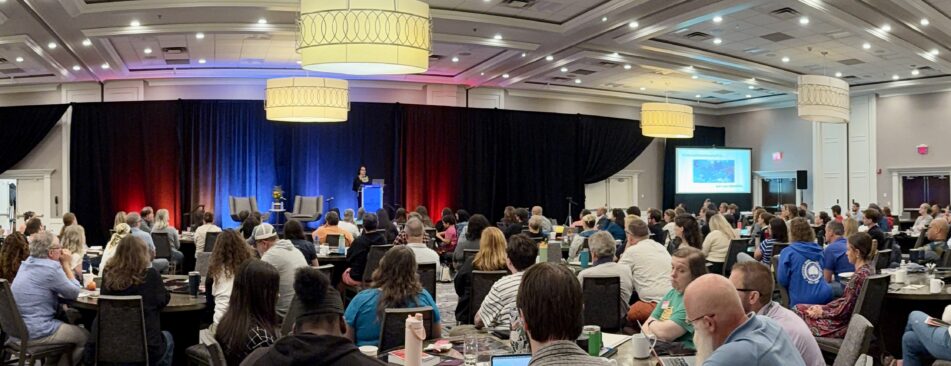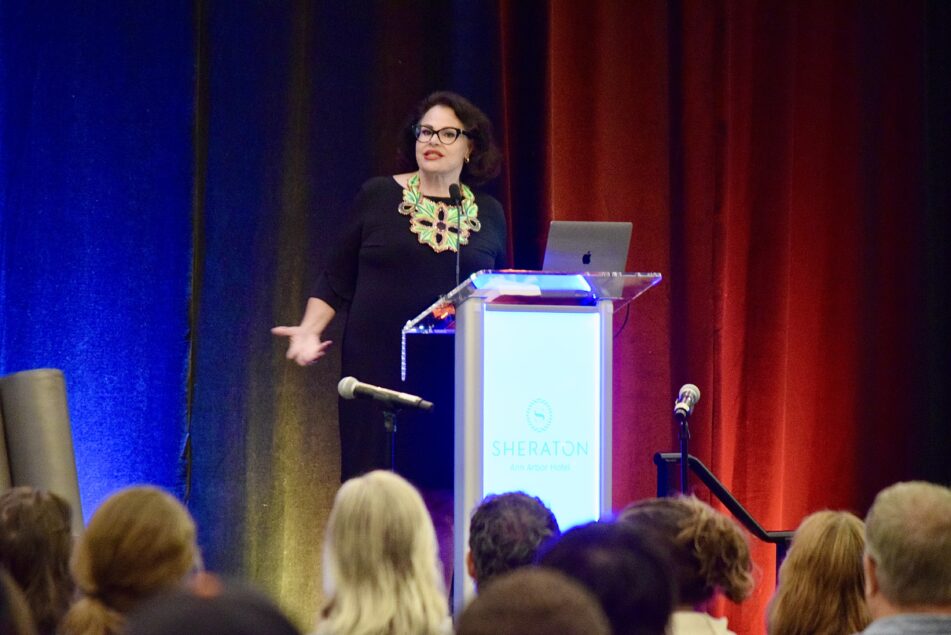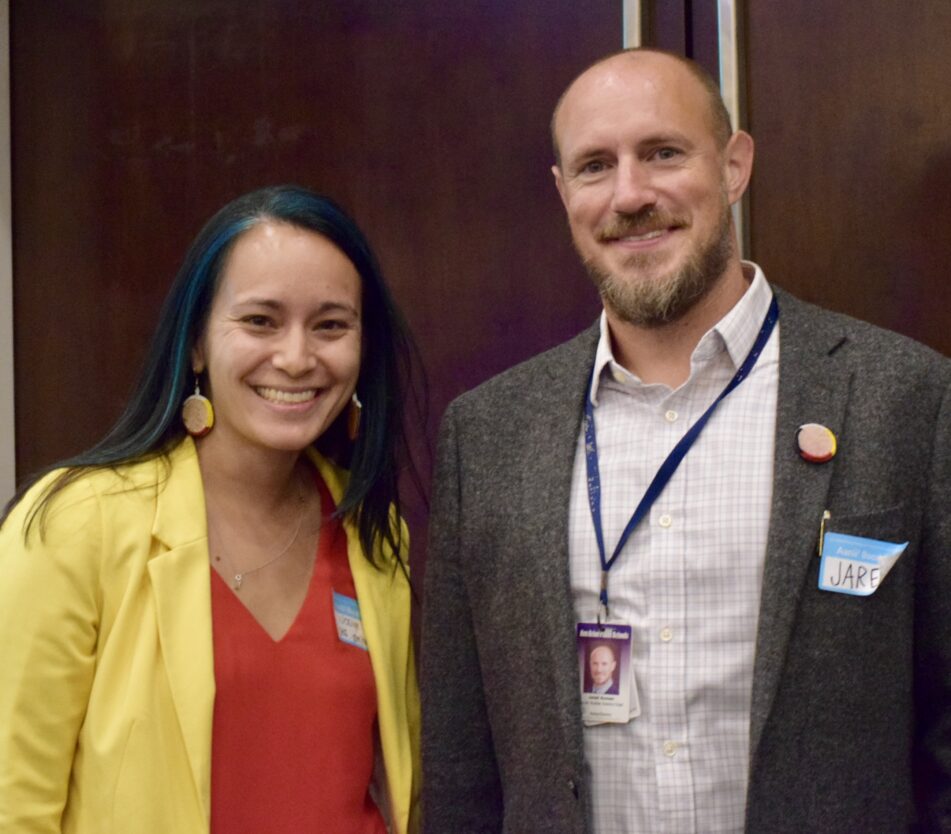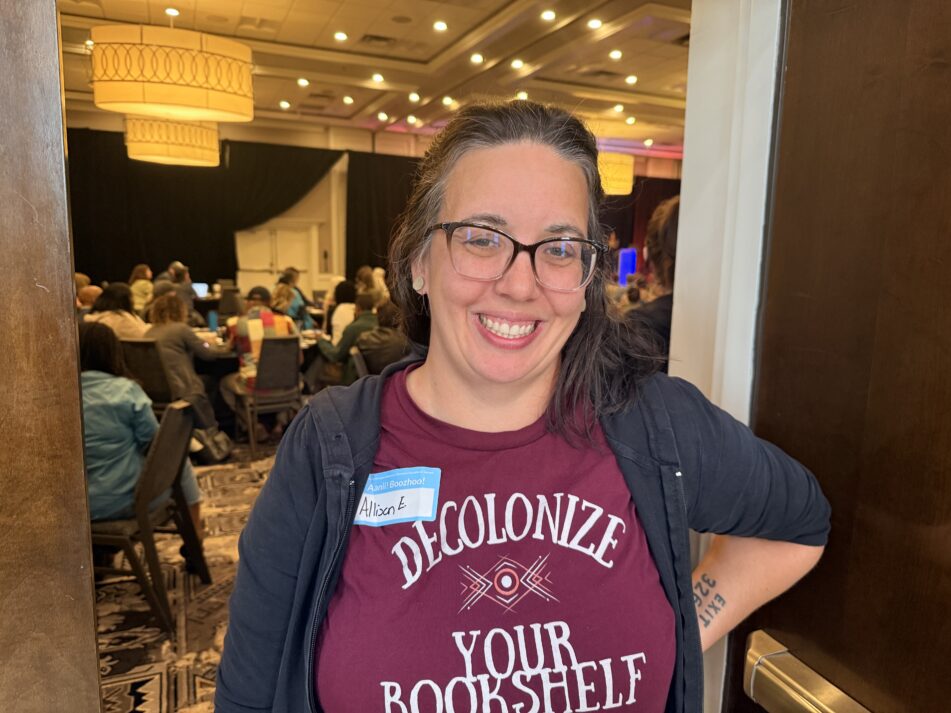Bestselling author Angeline Boulley headlines event showcasing Michigan Indigenous histories and cultures

Ann Arbor Public Schools brought together district social studies teachers, English Language Arts educators, and librarians today for “Amplifying Michigan Indigenous Narratives,” an educational summit featuring bestselling author Angeline Boulley that marked the culmination of a transformative $750,000 grant project.
Since the spring of 2024, the ambitious “Michigan Indigenous Histories, Cultures, and Governance Project,” funded by the Michigan Department of Education Section 99d Grant for Teaching Diverse Histories, has been aimed at transforming how Michigan’s Indigenous histories and cultures are taught in classrooms.

Wednesday’s event, which was held at the Sheraton, was held as part of the district-wide Professional Development day.
Boulley, author of the acclaimed novels “Firekeeper’s Daughter” and “Warrior Girl Unearthed,” delivered a compelling keynote speech, emphasizing her journey as a writer and how Indigenous stories connect across cultural boundaries while remaining rooted in specific communities.
“James Joyce wrote that in the particular, we find the universal,” Boulley told the crowd. “They’re very particular to our communities, but there is a universal appeal—people say, ‘Oh, my auntie’s just like that.'” She shared how readers from all backgrounds connect with her work, demonstrating literature’s power to bridge differences.

Boulley challenged educators to go beyond symbolic gestures: “Every time you hear a land acknowledgement, go and buy books by a Native author. Read it, review it online, recommend it to friends. That is gold.”
When Dawn Linden, the district’s Assistant Superintendent for Teaching & Learning, asked Boulley what she would change about public schools or advise the district to do differently, her response drew applause: “I think that whatever the athletics budget is for schools, it should be the same level of funding for libraries. Because when the ship goes down, who’s really going to have your back—the athletic director or the librarian? No offense to any athletic directors. Football players are still my type.”
Transforming Education Through Comprehensive Programming
This Michigan Department of Education grant has funded several key components that are reshaping how Indigenous histories and cultures are taught, including:
Professional Development Impact: Twenty-two AAPS middle and high school teachers completed 16 months of intensive training, including place-based learning trips to Indigenous communities throughout Michigan. The results speak for themselves—Huron High School will offer Native Studies this spring as a direct result of the program.
Classroom Transformation: Teachers report dramatic improvements in their ability to authentically incorporate Indigenous perspectives. Scarlett Middle School’s Jake Engles describes connecting South African apartheid to the Potawatomi Trail of Death, deepening students’ understanding of both historical tragedies. His environmental studies unit now centers Anishinaabe perspectives on the Enbridge Line 5 pipeline, including powerful exercises where students write to descendants seven generations in the future.
Expanded Resources: More than 500 titles by Indigenous authors are being distributed across all AAPS schools, while new digital resources featuring Tribal Historian Eric Hemenway will be available statewide.
Community Connections: The Indigenous Artists Series has brought music and beadwork events beyond classroom walls, while teacher presentations at state and upcoming national conferences position AAPS as a leader in Indigenous education.
Lasting Benefits for Students and Community

Huron High School teacher Allison Echlin calls the program “an incredible experience and one of the most beneficial professional development programs of my life.” She credits it with making her “a better teacher,” explaining: “It has increased my knowledge level, which has allowed me to create new material for my students on topics such as treaty rights, sovereignty, voting rights, allotment, federal programs focused on erasure, and Indigenous resistance. Due to the program and the knowledge I have gained, Huron will be offering Native Studies in the spring.”

Jake Engles was equally enthusiastic: “First of all, the Indigenous Histories, Cultures and Governance PD’s have been by far the richest and most enjoyable of any Professional Development I’ve engaged with in my teaching career.”
He praised how program facilitators “created an environment where we as educators were trusted to engage deeply with rich content and learn from one another.”
Engles noted the respect built into the experience.
“I felt deeply trusted and respected to be able to do a great deal of learning with colleagues and allow that learning to permeate into our classrooms as opportunities presented themselves,” he said. “It has been an incredible experience, and I’m grateful to have been able to participate.”





The Educational Summit was a perfect culminating event of the grant work, said Community High School social studies teacher Joslyn Hunscher-Young, who is also CHS’s Diversity & Equity Lead.
“The stories and advice from Angeline Boulley and Eric Hemenway helped our teachers and librarians reflect and challenge ourselves,” she said. “Songs from Asiginaak-Negamojig and posters designed by Stacie Sheldon and Jasmine Culp helped showcase Ojibwe language and cultural traditions in meaningful and tangible ways.”
“I know my colleagues and I were inspired to continue learning and actively making shifts in our work with students to better honor, recognize, and teach the narratives of Indigenous people in Michigan throughout history and today. I’m excited to see how this helps AAPS and our broader community grow and change.”
Dawn Linden said the day was all about taking action to deepen AAPS educators’ understanding of Michigan’s Native past, present, and future.
“We are so deeply grateful for the support of our native partners,” she said. “The units of study being created will open doors and windows long overdue in our learning continuum.”


Be the first to comment